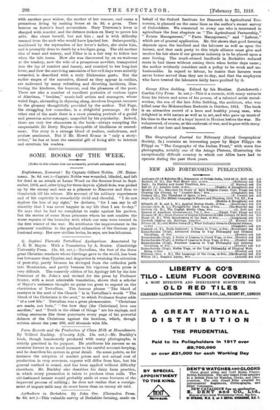FICTION.
A GIRL ALONE.* MR. MOWEL EvAws is careful to make it clear in his Preface that this is not exactly a novel with a purpose, though there are chapters in it which deal with woman's work in a sweated industry, and though he is firmly convinced that the war is not going to remedy the evil. He is " only a story-writer," and he is strongly of opinion that a writer of fiction should not pose as a social reformer. This declaration frees us from any obligation to discuss his story as a contribution to the study of social economics as they affect the woman worker. We may regard it rather as a study of the perils and trials which beset a friendless and penniless girl of gentle birth cast adrift in London to-day. Ellice Mayne came of good family. She had been born and bred in Australia, had lost her mother early, and on the death of her father returned to England in the full belief that a friendly solicitor, who had encouraged his "great expectations," was in a position to prosecute his claims to an estate and continue the subsidy of two hundred a year which was to be paid back when the claim was established. Ellice does not know a soul in London, and on repairing to the solicitor's office learns that he is dead, and that his successor has no intention of pushing the claim or continuing the allowance. On a second visit she finds that the office has just been burned down and all the papers relating to the claim destroyed. To complicate the situation, the cheap boarding-house where she had taken up her abode is raided by the police, the landlord being a notorious receiver of stolen goods, and she herself falls under suspicion. There is something • bordering on the artificial in the way in which her isolation is contrived—her entire friendlessness, coupled with these repeated strokes of evil fortune. But this is only the beginning of her troubles. She is lucky in securing decent lodgings with a poor but charitable widow, and, after various humiliating failures to secure employment, is engaged as a waitress in
teashop, only to be dismissed for resenting the odious familiarity of a customer who happens to be a shareholder. Her money is exhausted, and she is dependent on the charity of her hostess and his son, an insurance canvasser. When the son is killed in a street accident, the widowed mother, to avoid the workhouse, goes to keep house for a miserly cousin in Wiltshire. Ellice has already refused the assistance of a blackmailing solicitor, who offers to take up her claim, and has been grossly insulted by the wicked Baronet whose interests it threatens. Alone and penniless, she is rescued from starvation by Mary Trueman, a woman of the streets, is taken to a cheap lodging-house for the submerged class, and finds shelter • A Qin xone. By flown l Evan.. Leaden: Giant itteluirds. (52. with another poor widow, the mother of her rescuer, and earns a precarious living by making boxes at ls. 3d. a gross. Then horrors on horror's head accumulate. Mary Trueman's lover is charged with murder, and the defence reckon on Mary to prove his alibi. She clears herself, but not him ; and is with difficulty rescued from the mob who would have lynched her. Subsequently, maddened by the reproaches of her lover's father, she stabs him, and is promptly done to death by a hooligan gang. The old mother dies of want and misery, and Elliee is in a fair way to follow her when the tide turns. How she was discovered by an ex-waitress at the teashop, now the wife of a prosperous novelist, transported into the lap of comfort and luxury, and reunited to her long-lost lover, and how the surviving associates of her evil days were suitably rewarded, is described with a truly Dickensian gusto. But the earlier stages of the narrative, dismal as they appear in outline, are enlivened by many refreshing and diverting incidents, illus- trating the kindness, the humour, and the pleasures of the poor. There are also a number of excellent portraits of various types of Alsatians, "bookies," music-hall artists and managers, whose weird lingo, abounding in rhyming slang, involves frequent recourse to the glossary thoughtfully provided by the author. Ted Page, the struggling low comedian, is a delightful personage. At the other end of the scale there is a most pleasing portrait of a genial and generous actor-manager, unspoiled by his popularity. Indeed, there are very few characters in the book—always excepting the unspeakable Sir Derry Mayne—incapable of kindliness or amend- ment. The story is a strange blend of realism, melodrama, and profuse sentiment. But if Mr. Howel Evans is "only a story- writer," he has at least the essential gift of being able to interest and entertain his readers.



























 Previous page
Previous page